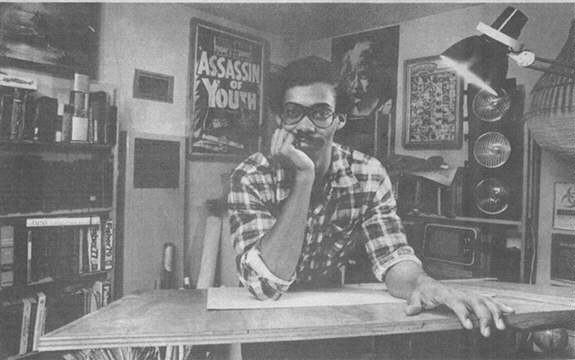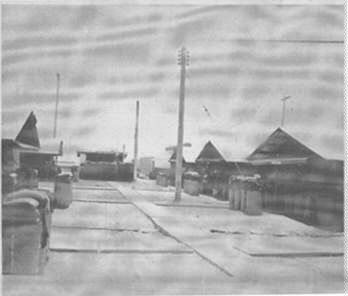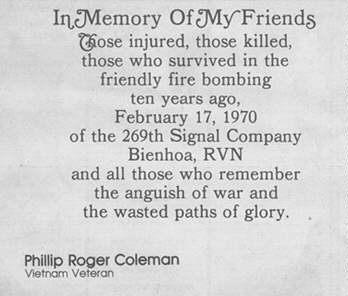-
Copyright © Since 1988
 The American War Library
From 17 February 1980
The American War Library
From 17 February 198010 YEARS LATER,
VET REMEMBERS THE "FRIENDLY FIRE"
by Rex Dalton
Special to The Daily Breeze, 2-17-1980
Photo by Jack Lardomita


 The American War Library
From 17 February 1980
The American War Library
From 17 February 1980

The company spent the night in the bunkers as the analysis team checked the area. It was then, Coleman said, when he and the others learned the artillery was "friendly fire," from a South Vietnamese unit miles away. The initial report was that a Viet Cong had given the Army of the Republic of Vietnam artillery platoon the coordinates of the camp, but Coleman says he doubts that. There were too many better targets around. Later, Coleman says word went around that a US Army officer gave the coordinates to the ARVN platoon in retaliation for someone in the company fouling up an important radio message. Whatever the reason, Coleman says memories of the incident are always with him. So others will be reminded, the bought a $500 full-page ad in an area weekly newspaper to commemorate the 10th anniversary of the shelling.


Now attending college, Coleman looks back on his military career with trepidation. He was 18 and had just moved to Los Angeles from Chicago when he enlisted in 1968. He had a morbid fear of crowds and didn't want to go through with his high school graduation ceremony, so he joined on a Monday and on Thursday was on his way to Basic Training in Northern California. "I'd seen the movie "Green Berets" and wanted to join immediately. I wanted to be a 30-year man and become a general, but that changed," he said.
Coleman said his disenchantment started in basic training when the was given a disciplinary citation for not having his poncho in his backpack. The citation cost him a chance to be in a more elite unit. Once he was in Vietnam in July of 1969, his concerns mounted. "Being there was a waste. It was a free-for-all. It's unfortunate, sad, so many things have been forgotten. Incredible things happened that have never been told. and the VA hospitals are filled with people who are reminders," he said. His Torrance apartment is extensively decorated, much of it with pictures of Vietnam. Newspaper clippings rporting the "friendly fire" incident are in a handy notebook."It's incredible to think of Americans firing on their own units. But you have to remember people were out of their minds over there," he said. "There was a real bad drug problem in our company. People were stoned all the time. Morale was bad. "The three top officers had been pulled out of the company camp that night. "We never got a confirmed report on what happened. We'll probably never know. The company disbanded shortly thereafter and I came back to Ft. MacArthur."
The final words in Coleman's memorial ad are for "All those who remember the anguish of war and the Wasted Paths of Glory." "I took the last words from a Stanley Kubrick film "Paths of Glory," It was about a French General in World War I who called in fire on his own people who didn't want to fight," he said. Vietnam War Friendly Fire Deaths
Vietnam War Friendly Fire Deaths For more information about this article, please write to:
For more information about this article, please write to: Return to Phill Coleman's Main Page
Return to Phill Coleman's Main Page
=forvets&font=hito">